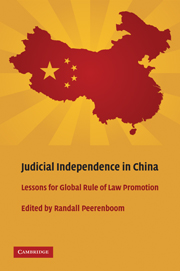Book contents
- Frontmatter
- Contents
- Contributors
- 1 Introduction
- 2 Halfway Home and a Long Way to Go
- 3 A New Approach for Promoting Judicial Independence
- 4 The Party and the Courts
- 5 Judicial Independence in China
- 6 A New Analytic Framework for Understanding and Promoting Judicial Independence in China
- 7 Judicial Independence and the Company Law in the Shanghai Courts
- 8 Local Courts in Western China
- 9 The Judiciary Pushes Back
- 10 Corruption in China's Courts
- 11 A Survey of Commercial Litigation in Shanghai Courts
- 12 Judicial Independence in Authoritarian Regimes
- 13 Judicial Independence in East Asia
- Index
- References
5 - Judicial Independence in China
Common Myths and Unfounded Assumptions
Published online by Cambridge University Press: 05 June 2012
- Frontmatter
- Contents
- Contributors
- 1 Introduction
- 2 Halfway Home and a Long Way to Go
- 3 A New Approach for Promoting Judicial Independence
- 4 The Party and the Courts
- 5 Judicial Independence in China
- 6 A New Analytic Framework for Understanding and Promoting Judicial Independence in China
- 7 Judicial Independence and the Company Law in the Shanghai Courts
- 8 Local Courts in Western China
- 9 The Judiciary Pushes Back
- 10 Corruption in China's Courts
- 11 A Survey of Commercial Litigation in Shanghai Courts
- 12 Judicial Independence in Authoritarian Regimes
- 13 Judicial Independence in East Asia
- Index
- References
Summary
The Chinese judiciary is regularly criticized for the lack of (meaningful) independence. The lack of “genuine progress” in establishing an independent judiciary is then cited as evidence that China's reform process is trapped in transition. In response, international donor agencies and bilateral legal cooperation programs have encouraged China to adopt the institutions and practices found in advanced Western states known for the rule of law.
Surrounding these views is a set of common myths and unfounded assumptions. The first assumption is substantive: the concept of judicial independence is clear, and there is a single agreed upon model or generally accepted set of institutions and best practices articulated with sufficient specificity to guide reformers. The second assumption is methodological: there are clear standards for measuring judicial independence. The third assumption is normative: we know how independent courts should be (at each stage of development). The fourth assumption is the more independence the better. The fifth assumption is that the lack of judicial independence is a serious problem in all types of cases in China. The sixth is that China's courts lack independence because independence is impossible within a single-party state. The seventh, and a corollary, is that the party is the main source of interference with the courts. The eighth – and perhaps the granddaddy of them all – is that were China to suddenly democratize, judicial independence would no longer be a problem.
- Type
- Chapter
- Information
- Judicial Independence in ChinaLessons for Global Rule of Law Promotion, pp. 69 - 94Publisher: Cambridge University PressPrint publication year: 2009
References
- 7
- Cited by



